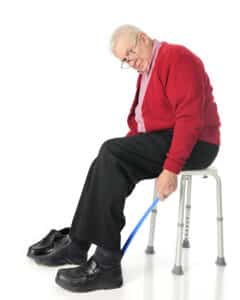
Understanding the serious risks that your aging parent faces and understanding what you can do to help protect your parent from those risks is one of the most important things that you can do as a family caregiver. This helps you to recognize changes that you can make in your care routine and additional services that you may need to arrange for your parent to prevent serious consequences. One such risk is falls. Each year millions of older adults throughout the United States suffer falls, and approximately 20 percent of them will experience a serious injury such as a traumatic brain injury or a broken bone. This makes it vital for you to do everything that you can to reduce their risk and keep them safer and healthier as they age in place. A particularly simple, yet often overlooked, issue that you should consider when evaluating your parent’s fall risk is the shoes that they wear.
Some of the ways that you can ensure that the shoes your parent wears will help to minimize their risk of suffering a fall include:
• Ensure that they are well-fitting. Shoes that are too large can cause tripping, while shoes that are too tight compromise gait
• Look for proper support. A foot that is not well-supported in a shoe is more likely to “wobble”, potentially leading to an ankle twisting or the person losing their balance and not being able to right themselves
• Avoid backless designs. Shoes without backs are more difficult to keep on the feet, which can mean that your senior might step out of them accidentally and trip.
• Go for grip. Elderly adults tend to have a gait that is more “shuffling” than younger people. This can mean that your parent scrapes their feet across the floor rather than lifting them all the way up. Shoes with firm grips on the bottom help to reduce the risk that your senior will slip while walking. Avoid shoes with excessive grip, however, as this might cause them to not be able to move smoothly and effectively.
Starting home care for your aging parent can be one of the best decisions that you can make for them during the course of your caregiver journey with them. An in-home senior care services provider can be in the home with your senior family member on a customized schedule that ensures that they get all the care, assistance, and support that they need, while also keeping you at the front of their care routine. You can feel confident that your loved one will be able to pursue a lifestyle that is safe, healthy, and comfortable while also maintaining as much independence and fulfillment as possible. When it comes to protecting your parent from falls, this home care provider can help to identify potential hazards in the home and their routine, and provide assistance and support during daily activities to address challenges and limitations so that they are able to avoid the potentially devastating consequences of these falls.
http://www.mayoclinic.org/healthy-lifestyle/healthy-aging/in-depth/fall-prevention/art-20047358
https://www.cdc.gov/homeandrecreationalsafety/falls/index.html
https://www.cdc.gov/media/releases/2016/p0922-older-adult-falls.html
If you or an aging loved one are considering home care in The Heights, TX, please call the caring staff at At Your Side Home Care. We will answer all of your senior care questions. Call today: (832) 271-1600.
Our Certified Nurse Aides, 24-Hour Live-in Assistants and Home Health Aides are available 24 hours a day, 365 days a year. We also provide the security and confidence of 24-hour Telephone Assistance, so fast, reliable help is always available when it's needed. To learn more about our homecare services see our homecare services page.
Different people need different levels of homecare. To meet the requirements of our clients, At Your Side Homecare maintains consistent staffing levels of caring professionals. Homecare service is available for as little as a few hours a week, or as many as 24 hours a day, seven days a week
- 5 Signs a Senior Might Be in the Beginning Stages of Dementia - April 25, 2025
- What Solutions Can Help Seniors with Mental Health Challenges? - April 18, 2025
- How Does Senior Home Care Help Make Aging in Place Possible? - April 11, 2025



